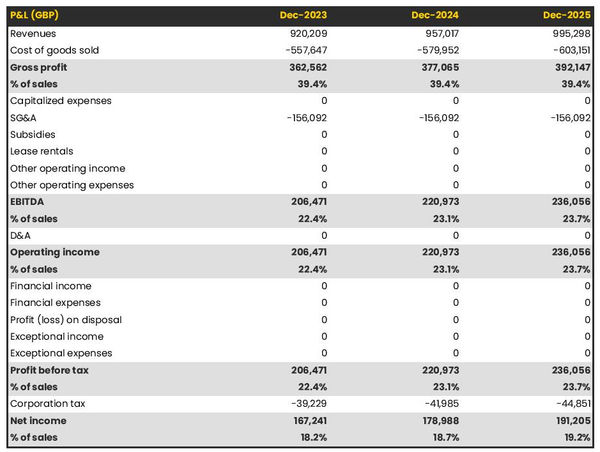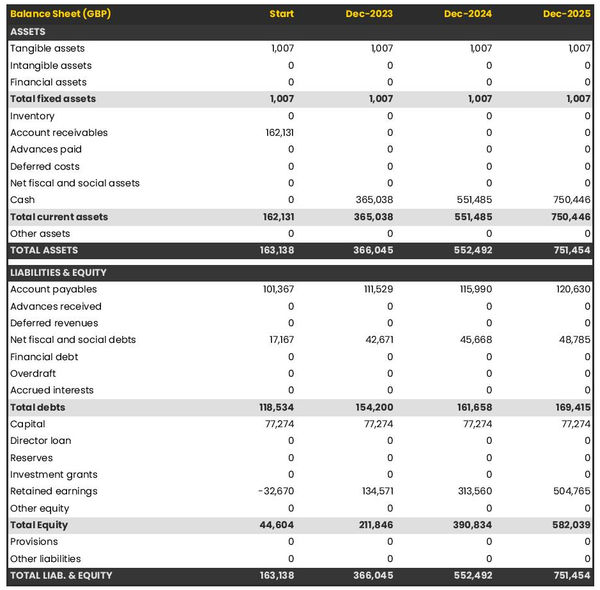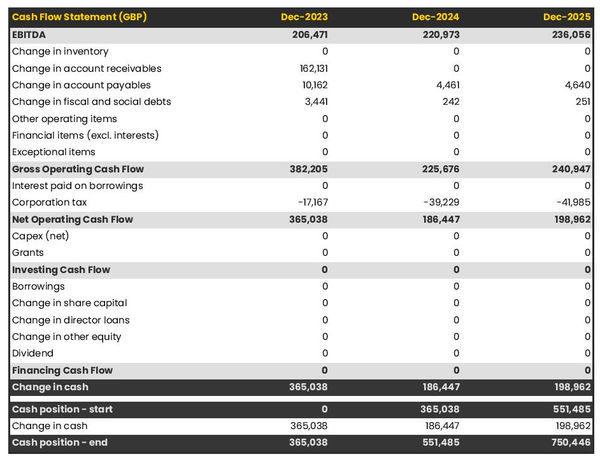How to write a business plan for a security company?

Writing a business plan for a security company is essential if you are either starting up or looking to expand and grow your existing security business.
This guide will provide information on why you need to write a business plan for a security company, what information is needed, what should be included in the plan, and which tools can be used to create it.
Whether you're just getting started with your enterprise or looking for ways to improve profitability, this guide will give you the insight and knowledge you need to craft an effective business plan.
Why write a business plan for a security company?
There are several reasons to write a security company business plan. Below, we cover some of the most important ones!
To set a clear roadmap
Writing a business plan for a security company is an essential part of running a successful business. It not only helps you set objectives and goals for the next 3-5 years, but also provides existing security companies with an opportunity to evaluate their current performance and develop strategies for future growth.
A comprehensive business plan can help pinpoint areas in need of improvement, identify potential opportunities, and create actionable steps towards achieving these objectives.
Writing a business plan forces you to think critically about your business’s direction, long-term goals and financial performance which are all necessary components of any successful enterprise.
To get clarity on your cash flow
Writing a business plan for a security company is an essential tool for entrepreneurs to stay on track with their financial goals.
Not only does it provide structure and direction, but it also allows you to compare your actual performance against what was planned, enabling adjustments as needed.
Having a sound business plan in place will help you identify potential problems, such as a financing shortfall or insufficient profitability, early on and will allow you to recalibrate your financial forecast accordingly.
This helps ensure that the security company remains financially sustainable and profitable even when faced with unforeseen challenges or changes in the market.
To secure financing
A security company business plan outlines the goals and objectives of your organisation, provides financial projections and details how you intend to use the financing sought from potential lenders or investors.
The bank will use this document to assess your ability to repay the money they lend to your business. Therefore, creating a comprehensive yet concise business plan is paramount in order for businesses in the security sector to secure financing from banks.
When looking to secure financing from an equity investor, writing a business plan for your security company is also key. Investors need to be assured that their investment will generate a good return on investment and they will look closely at the growth, profitability and cash generation of your security company when reviewing your business plan.
Now that you know why it is important to write a business plan for a security company, let's look at the information needed to create one.
What information is needed to create a business plan for a security company?
Writing a security company business plan requires research so that you can project sales, investments and cost accurately in your financial forecast.
In this section, we cover three key pieces of information you should gather before drafting your plan!
Carrying out market research for a security company
Before writing a business plan for a security company, it is important to carry out thorough market research.
This helps ensure that the plan accurately reflects the current and future state of the industry, allowing you to make realistic projections about potential revenues.
Market research also provides critical insights into customer needs and preferences which can be used to inform and refine your security services offering. It also allows you to identify areas of opportunity in order to capitalise on them with targeted marketing strategies.
Developing the marketing plan for a security company
Creating a marketing plan for a security company involves setting aside dedicated funds for sales and marketing activity.
This budget must be carefully calculated in order to ensure that the right amount of resources are available to generate the desired level of sales.
Careful consideration should be taken when constructing this marketing budget, as it will need to cover everything from advertising and promotions to staff wages and other associated costs.
By incorporating this budget into the overall business plan, it will be possible to ensure that all of the necessary resources is available to deliver the expected growth.
The staffing and equipment needs of a security company
Before writing a plan, it is important to consider the recruitment plan and investments that will be required to set up and expand the business as this will be needed when creating the financial forecast.
This includes costs associated with hiring security personnel, purchasing equipment such as uniforms and patrol cars, and establishing any necessary training programs.
Additionally, you should take into account any other overhead costs such as rent, insurance, travel expenses, and more.
Once you have the information needed to create the business plan for your security company. it is time to start creating your financial forecast.
What goes in the financial forecast of a security company?
Creating a financial forecast for a security company involves producing the following key financial tables:
- Profit and loss statement (P&L),
- Balance sheet,
- Cash flow statement,
- Sources and uses table.
Let’s take a closer look at each of them.
The projected P&L statement
A projected P&L statement for a security company tells you how much money the company will make and how much it will grow in the future.

The projected balance sheet of your security company
A balance sheet is a critical financial document that provides an overview of the financial health of a security company.
It shows a company’s assets, liabilities, and owner's equity at a given point in time.
- Assets are items such as cash, accounts receivable, inventory, land, and equipment that are held by the company and can be used to generate revenue.
- Liabilities are debts the company owes such as accounts payable, loans, and taxes.
- Owners' equity is the difference between what a company owns and what it owes, and a proxy for shareholder value.

When looking at a balance sheet for a security company, lenders, investors, and business owners can assess the company's solvency (the ability to pay its debts over the medium term) and liquidity (the ability to pay its debts over the next 12 months).
A weak balance sheet may signal potential risks or financial distress. Furthermore, by examining the trends of a company's assets and liabilities over time, lenders and investors can get an idea of how well the company is managing its finances.
The projected cash flow statement
A projected cash flow statement shows how much money is expected to be generated by the business in the future.
You can then use this information to make decisions on how to best use your resources, like investing in new equipment or hiring more staff.

Having a projected cash flow statement is important because it gives stakeholders an idea of what the financial situation will look like and allows them to plan accordingly.
The initial financing plan
An initial financing plan is a way of organising the money that a security company needs to start. It lists where the money will come from, such as investments or loans, and what it will be used for, like buying equipment or funding working capital.
Having an initial financing plan is important because it helps make sure the security company has enough money to get started.

Looking at a financial forecast in isolation is not enough, in order to assess if the forecast is relevant and realistic the reader of your security company’s business plan needs to understand the context behind the numbers. That’s where the written part of the plan comes into play.
What goes in the written part of a security company business plan?
The key components that make up a comprehensive security company business plan include the executive summary, the presentation of the company, the products and services section, the market analysis, the strategy section, the operations section and the financial plan.
Let's have a look at each section in a bit more detail.
1. The executive summary
The executive summary of a security company plan provides an overview of the business, its services, the market in which it operates, some key financials, and an ask for the reader.
The executive summary should start with a concise description of the company and its services.
The market overview must then provide a quick analysis of the local market. This should emphasise why the security company is needed in the market, what sets it apart from its competitors, and how it can help to meet customer needs.
Key financials should then be presented in a simplified format to provide an overview of expected revenues, profits and cash flows.
Lastly, a concise 'ask' should be included outlining the objectives of the business plan: secure financing for example.
The executive summary of your security company business plan should be written with precision and detail, as it is the first thing potential lenders or investors will read when considering funding the project. It must therefore be persuasive enough to entice readers into learning more.
2. The presentation of the company
The presentation of your security company should include an overview of the company's structure and ownership, information about its physical location, as well as a detailed introduction to the management team.
Regarding structure and ownership, it is important to provide detailed information on who owns the company and how it is structured, including any subsidiaries or related entities. It is also important to provide information on any significant shareholders, as well as the company's shareholding structure.
When it comes to location, the business plan should include a map of the physical location and serviceable area of the security company.
Finally, it is important to introduce the management team of your security company, including their roles and responsibilities, relevant experience, and any qualifications they may have. This information should help potential investors get a better understanding of who will be in charge of running the business.
3. The products and services section
After reading the products and services section of your security company's business plan, the reader should have a clear understanding of what types of security services are being offered along with any other related services.
For example, are you providing security guards? Do you also offer canine and mobile patrols? Or are you offering a full service including CCTV and alarm monitoring and response?
This section should also provide details about how these services are conducted and how they can benefit clients.

4. The market research analysis
When presenting the conclusion of your market analysis in your security company's business plan, you should include detailed information about your target customer demographics and segmentation.
This will help lenders and investors understand who the company is targeting with its services, and help inform their opinion of your commercial potential.
In addition to demographic information, it's also important to provide an overview of your competition in order to show potential investors why your service stands out from others in the local market.
You should also explain any relevant regulations you must adhere to when operating.
By providing such details you will give potential lenders and investors a clear understanding of how well-positioned you are for success in this competitive industry landscape.
5. The strategy section
The strategy section of your security company’s business plan should detail your competitive edge, pricing strategy, marketing plan, milestones and risks and mitigants. This will give potential investors or banks an understanding of how you intend to make your business successful.
Your competitive edge subsection should include information on what sets your security company apart from others in the industry. You may have unique services or technologies that allow you to offer better protection than competitors.
Your pricing strategy will also be important for investors as they want to understand how much profit can be expected from each customer and if there are any opportunities for growth through bundles or special offers. Include details such as the cost per service provided and any additional fees associated with the packages offered by the company.
Also, make sure to explain how these prices compare with those of other companies offering similar services in order to highlight why customers should choose yours instead.
Your sales & marketing plan should explain what actions will be implemented in order to generate leads and customers for your business.
The milestones subsection will present the key achievements to date and the main objectives for the coming years.
Finally, the strategy section should explain which risks have been identified and how these risks can be minimised or eliminated.
6. The operations section
A security company business plan should also clearly explain how the operations of the business are organised.
This includes details on staffing, hours of operation and roles, both for frontline and support staff, key assets, and suppliers that the business plans to work with.
Staffing is one of the main aspects of a security company and it is important to provide details about how you will recruit, train, and retain frontline staff working for the company.
This can include a list of roles and responsibilities for the staff members, as well as a recruitment plan. It is also important to include information about how the company plans to manage staffing levels during peak times.
You should also detail key assets required to operate the business such as vehicles and equipment that are necessary for operations. Any intellectual property that the business needs to operate should also be included.
Finally, potential suppliers should be evaluated and included in the plan. This will help convince lenders or investors of the company's commitment to reliable suppliers.
7. The presentation of the financial plan
The financial plan section is where you will present the forecast that we talked about earlier in the guide.
Now that you know what a security business plan contains, let's take a look at the tools available to create one efficiently.
What tool should I use to write my security company's business plan?
In this section, we will review three solutions for creating an effective business plan for a security company: using Word and Excel, hiring a consultant, and using online business plan software.
Create your security company's business plan using Word and Excel
Using Excel and Word to create a business plan for a security company might seem like a good idea at first given that it is quite cost-effective.
But using Excel to create a financial forecast for the security company is complex and, unless you are trained in accounting and financial modelling, is prone to mistakes which may make financiers sceptical of your forecast’s accuracy.
Furthermore, it takes a long time to create these forecasts in Excel, and they are not easy to update as time goes by.
The same goes for writing a business plan with Word. You will likely be starting from scratch and spending hours formatting the document to get a result that looks professional.
Hire a consultant to write your security company's business plan
One of the pros of outsourcing your security company's business plan to a consultant or accountant is that they are well-versed in writing them!
Both consultants and accountants can provide error-free financial forecasts, though accountants are less likely to lend a hand with the written part than consultants.
Unfortunately, there are also cons to outsourcing your security company’s business plan.
The main one is that the consultant or accountant may not have the industry expertise needed to make accurate sales forecasts, and will have to rely on your sales projections instead.
Additionally, it will be quite costly to hire a consultant or accountant for this service and unexpected expenses can arise if changes need to be made. As a rule of thumb, budget a minimum of £1.5k ($2.0k) for a complete outsourced business plan.
Use an online business plan software for your security company's business plan
Another alternative is to use online business plan software. There are several advantages to using specialised software:
- You are guided through the writing process by detailed instructions and examples for each part of the plan
- You can be inspired by already written business plan templates
- You can easily make your financial forecast by letting the software take care of the financial calculations for you without errors
- You get a professional document, formatted and ready to be sent to your bank
- The software will enable you to easily track your actual financial performance against your forecast and update your forecast as time goes by
If you're interested in using this type of solution, you can try our software for free by signing up here.
We hope that this article has helped you to better understand how to write the business plan for a security company. If you still have questions, do not hesitate to contact us.
Also on The Business Plan Shop
- Business plan vs budget: what's the difference?
- How to do a market analysis for a business plan
- Should I use an accountant or business plan writer?
Know someone in the security business? Share this article with the click of a mouse!





